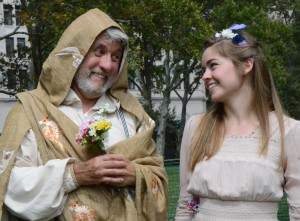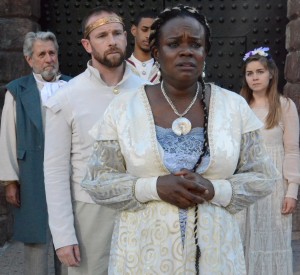New York Classical Theatre (NYCT) is a small troupe presenting distinguished plays, mostly tried and true, with occasional novelties in public spaces around New York City. Stephen Burdman, the company’s founder, espouses a performance style he calls “panoramic theater,” which involves spectators following actors as they perform scenes in multiple spots.
The Rewards of Being Frank
A sequel to The Importance of Being Earnest? It’s a tall order, given how frequently Oscar Wilde’s 1895 masterpiece returns, and how beloved it is. Alice Scovell’s attempt, The Rewards of Being Frank, gets a few things right and several things wrong, and it’s not the strongest production that New York Classical Theatre has ever done. But if you’re curious about what happened to Ernest and Algernon and Gwendolen and Cecily, and are willing to suspend a fair amount of disbelief, you’ll have a decent time.
A Civic Jewel—and Free!
There is something appropriate about offering Shakespeare for free in the parks of New York City. Like the great rivers and mountains of the earth or the stars and planetary system—which charge no admission for us to admire them—Shakespeare is a force of Nature that belongs to us all.
Artistic Director Stephen Burdman has made it the mission of the New York Classical Theatre to bring free Shakespeare productions to various parks during the summer: following this year’s production of A Midsummer Night’s Dream is the late romance The Winter’s Tale, brilliantly conceived, acted, and deeply moving, to boot.
The Winter’s Tale, first performed 405 years ago in 1611, is about the fallout of a king’s jealousy when the ruler, Leontes, wrongly imagines that his devoted wife, Hermione, has consorted with his best friend, King Polixenes, and that the child she is to bear him is not his. Only after the death of Leontes’ young son and sole heir, Mamillius (Peyton Lusk is delightful in the role), followed by the death of his faithful queen, does the king awaken from his madness and see his foul crimes for what they are.
Here is a feast of self-deception, delusion and jealousy for Shakespeare to plumb in all of the pity and horror his majestic language can inspire before the play resolves, after an improbable leap of 16 years in time, on happier notes: the reunion of the two friends, Leontes and Polixenes; the forthcoming marriage of their children, Florizel and Perdita; and most ridiculously wondrous of all, the revelation that the statue of the long-dead queen is really a living and breathing Hermione, now returned to the bosom of her husband and family. If the question is whether or to what extent a particular performance of The Winter’s Tale allows the audience to utterly suspend their disbelief when confronted by such leaps in time and “happy” endings, the production did very well indeed.
Brad Fraizer in his beautifully acted role as Leontes carries the emotional sweep of the play from his increasingly insane jealousy to the extremes and horror of recognition of his crimes, and from there to the reconciliations wrought by Time and Chance. It is a challenging role.
David Heron as his beloved childhood friend, King Polixenes, is commanding and passionate in his role. Hermione, so profoundly wronged by her husband, is portrayed by Mairin Lee with a queenly elegance, dignity and sensitivity. Mark August, who plays the clown, Autolycus, is extraordinary and deserves special mention for his comic brilliance and gifts. So, too, does the stirring performance of Lisa Tharp as Paulina, maid in waiting to the Queen, whose impassioned rebuke to Leontes for his treatment of his wife is heart-piercing. For all of the loveliness of the outdoor setting, it also places special demands in clearly projecting Shakespeare’s language, to which the cast rose magnificently.
As the play moves from Act II to Act III, the audience also moves—from Clinton Castle (Leontes’ court in Sicilia) to a lawn overlooking the Hudson River (the shores of Bohemia). Burdman calls this his “panoramic” technique, a method by which the audience is less a witness to the actions before it than at the center of those actions. It is as if the viewers were really accompanying the courtier Antigonus, sent by the mad Leontes to abandon his own newborn daughter, Perdita. Over the Hudson, just in front of the audience, is a real cloud-flecked sky with real birdsong mixing with the sounds of the city in the background. Scene iii of the next act takes place on a different lawn (another location in Bohemia) to which the actors, again, lead the audience. The scene is one of a sheep shearing and, as evening gathers, the audience sits amid trees and grass exactly as they might at a real sheep shearing.
In Burdman’s “panoramic” approach, the entire park is our stage. There are no sets. Scenes are acted in different areas of the park with the audience sitting on the ground or grass, and the staff, in the first row of the audience, shining flashlights on the characters once it has become dark. Shakespeare’s language and his dramatic exploration of human character and heart fill the entirety of the space with no theatrical paraphernalia to draw off attention. And the effect is simply stunning, as less proves so much more! There is no lovelier way to spend an evening than to allow Shakespeare’s magic to sizzle and cast a net over you and over the city itself.
Meet outside Castle Clinton in Battery Park at 7 p.m. nightly (except Thursdays) through Aug. 7 (via 1 train to South Ferry or the 4/5 to Bowling Green). The Winter’s Tale will then move to Brooklyn Bridge Park from Aug. 9-14 (take F train to York, 2/3 to Clark or A/C to High), also at 7 p.m. There will be no performance on Aug. 11.
Central Park or the Forest of Arden
Often, when New Yorkers think of theatre in Central Park, they think of the Public's Shakespeare in the Park at the Delacorte Theatre. Flying under the radar of the Delacorte, however, are other theatrical happenings taking place in the nooks and crannies of Central Park. One of these lesser-known jewels is the New York Classical Theatre, who have been performing their signature "panoramic theatre" in public outdoor spaces such as Central Park, Prospect Park and Battery Park since 2000. Under the artistic direction of Founder Stephen Burdman, the New York Classical Theatre has most recently applied their panoramic style (a roving, interactive experience that adapts each script to its location) to Shakespeare's As You Like It. While staging moveable theatre in a park has its obvious difficulties -- such as lighting, sound, and seat comfort -- the overall experience of As You Like It is a delightful summer treat for all ages.
The performances in this play deserve special applause. While some of the movement is a bit grandiose, this is probably an attempt to fill the unique and sprawling space of Central Park-as-stage. The cast works together to keep energy high and the pace clipping. Rin Allen breathes new life into the cross-dressing Rosalind, delivering her lines with vocal color and physical playfulness. Clay Storseth delivers Jaques' beloved "All The World's a Stage" monologue with insightful nuance. Also notable is Antoinette Robinson's sassy Phoebe. Overall, the ensemble has an excellent command of Shakespearean language, making the plotline accessible to even the most inexperienced Shakespeare audiences.
New York Classical Theatre employs crafty design techniques to overcome the obstacles of staging As You Like It outdoors. Once the sun goes down, company interns whip out an arsenal of flashlights to light the action. While only partially effective in illuminating the faces of the actors, this makeshift lighting technique creates a magical, "summer camp" type of atmosphere that trumps any expensive lighting system in town. Similarly, without amplification, the actors must use extra projection to compete with the rich soundscape of the park: birds, crowds of tourists, people on cell phones, passing ambulances, etc. These moments of aural interference, however, only enhance the excitement created by the re-articulation of a public space like Central Park. As you move from scene to scene, be sure to sit close to the action so you can catch most of the lines spoken by the talented performers. Also, since you will be sitting on the ground, bringing a picnic blanket might not be a bad idea.
Unlike the Shakespeare in the Park series at the Delacorte, audiences need not wait in long lines to get tickets. New York Classical Theatre productions are completely free and you can show up at any time to join. For anyone who enjoys both serious theatre and summer fun, As You Like It is an enchanting summer treat.
Performances of As You Like It runs at Central Park (West 103rd Street and Central Park West) on Thursdays through Sundays until June 22. Performances in Prospect Park (Long Meadow near the Picnic House - 5th Street and Prospect Park West) run every night, June 24–29. Performances in Battery Park (meet in front of Castle Clinton) run Tuesday through Sunday, July 1– 27. All performances are free, begin promptly at 7 p.m., and last two hours. For more information, call 212-252-4531 or visit www.newyorkclassical.org.











